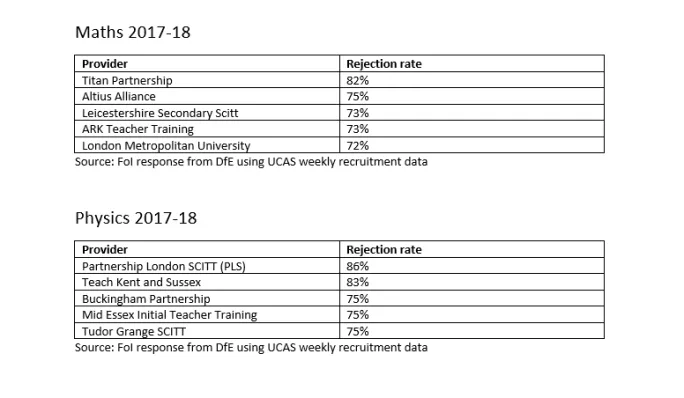- Home
- Exclusive: 100% rejection for aspiring teachers in shortage subjects
Exclusive: 100% rejection for aspiring teachers in shortage subjects

Some teacher training providers are turning away all the applicants they receive to train for some shortage subjects, new figures obtained by Tes reveal.
Training providers’ rejection rates in priority subjects, are as high as 100 per cent of applicants in computing and above 80 per cent in maths and physics, according to a Department for Education freedom of information response.
The DfE wants to bring down rejection rates generally as it seeks to solve the teacher supply crisis. But very low numbers can be involved and the providers say have to turn away applicants that are unsuitable.
The figures, for 2017/18, shows that two school based training providers - the West Midlands Consortium and North Essex Training - turned away 100 per cent of the applicants they received from would-be teachers in computing.
But North Essex says it only received one application for the subject.
Titan Partnership had the highest maths rejection rate at 82 per cent and Partnership London Scitt (PLS) had the highest physics rejection rate at 86 per cent. (see table below).
The providers have been contacted for comment. The figures reveal that:
- For maths, the average rejection rate was 46 per cent, but 10 institutions turned away at least two-thirds of candidates.
- In physics, the average rejection rate was 40 per cent, but 9 institutions turned away at least two-thirds of candidates
- In computing, which has an average rejection rate of 40 per cent, two institutions turned away all candidates and a further five turned away 80 per cent or more.
Maths, physics and computing are all deemed high priority subjects by the Department for Education and are uncapped meaning that institutions can take as many students as they want.
But initial teacher training providers are inspected by Ofsted on their selection procedures and completion rates, meaning there is no incentive to take on candidates who are unsuitable and likely to fail.
Earlier this year, the DfE changed the criteria for initial teacher training providers saying that rather than having to ensure that their selection procedures assess entrants “suitability to teach” they must now assess their suitability to “train to teach”.
And schools minister Nick Gibb, sent a letter to all providers saying that institutions would be required to demonstrate what they are doing to maximise recruitment and officials would be scrutinising the data “to judge whether any institutions have particularly high rejection rates in priority subjects”.
But providers say that some candidates will apply without having the required standard in English and maths or higher qualifications.
And they point out that rejection rates - which the Department for Education raised concerns about earlier this year - are also skewed because admissions body UCAS records candidates who don’t attend interviews as rejections by institutions.
“No potential teacher is ever rejected if they have the potential to become a teacher,” Craig Benham, Scitt development manager for Leicestershire secondary SCITT [school-centred initial teacher training], said.
The Leicestershire secondary SCITT took on seven of the 27 people who applied to do maths in 2017.
Mr Benham said he could not comment on individual applications. But if people were rejected after going through the selection process the Scitt gave them detailed feedback on what they needed to do to make a successful application the following year.
A spokesperson for Birmingham University, which rejected 92 per cent of computing applicants last year, said: “We only briefly offered teacher training for teachers of computing in 17/18 and received very few applicants, with quite a lot of unsuitable applications.
“We do not currently offer a programme of teacher training for teachers of computing.”
Titan Partnership responded that of the 12 people who had applied, one later withdrew, leaving 11 applicants. Five did not meet the initial selection criteria, four failed at interview and Titan offered places to two candidates. It adds that one of the unselected candidates last year has now been offered a place for this year after taking subject knowledge enhancement course.
A spokesperson for Altius Alliance, which rejected 75 per cent of maths candidates, said: “We had four applications for a place to train to be a maths teacher. Of those four, we have recruited one person who meets the minimum criteria and was successful in the interview process.”
Ark Teacher Training, which has an Ofsted report rating it outstanding in all areas, said that the number of trainee teachers that it can accept is defined “by the needs and budgets of our schools”.
And London Metropolitan University said that it had more than 100 applications for the 15 places it had been allocated for PGCE maths - and eventually enrolled 27 people.
The university said 29 people had not met the entry requirements and a further 78 had been rejected because they applied late, after the course had started or did not turn up to interview.
Mid Essex Initial Teacher Training had a 75 per cent rejection rate for its physics course according to the DfE figures. But the provider said that just three people had applied and one was offered a place.
The figures come amid growing concern about teacher shortages.
The latest figures from UCAS for recruitment to teacher training courses starting in September 2018 show that applications are down by 15 per cent on the same time last year.
A DfE spokesperson said: “Last year, more than 50,000 applications to initial teacher training were rejected by providers and, while it is right to reject candidates who are not suitable, we want to make sure that no candidate with the potential to become a great teacher is turned away.
“There are a record number of teachers in our schools - 15,500 more than in 2010 - and these changes will help ensure that trend continues by encouraging universities and schools to assess candidates on their suitability to begin training to teach, rather than expecting them to be ready to teach at the point of application to training courses.
“The bar for entrance to the teaching profession remains as high as ever, as parents and pupils would expect, and this is evidenced by the fact that the quality of new entrants into the profession is at an all-time high, with 19 per cent of this year’s cohort holding a first-class degree.”

Keep reading for just £1 per month
You've reached your limit of free articles this month. Subscribe for £1 per month for three months and get:
- Unlimited access to all Tes magazine content
- Exclusive subscriber-only stories
- Award-winning email newsletters



